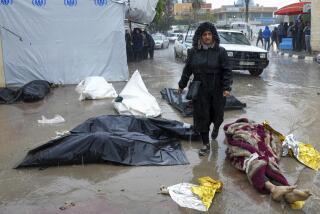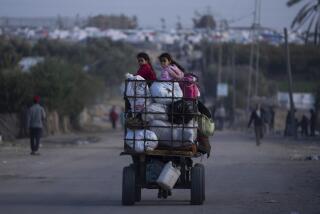A Truce in Tora Bora Appears to Falter
- Share via
TORA BORA, Afghanistan — Coalition forces struck hard by land and air at the last stronghold of Al Qaeda fighters here Tuesday, triggering at least a temporary cease-fire and a promise by some of them to surrender at daybreak today.
But as the sun this morning brightened the chilly mountains of eastern Afghanistan, sporadic gunfire and mortar explosions echoed through the canyons. No Al Qaeda fighters appeared immediately, but some local commanders said they were still expecting a surrender. A circling B-52 bomber renewed airstrikes on the remnants of Osama bin Laden’s forces.
In the sudden silence that had settled over the mountains Tuesday, tribal commanders gave the Al Qaeda fighters one night to come down from their caves and mountain hide-outs and turn themselves in for international prosecution.
The opposing warriors arranged a meeting at daybreak near a pair of observation huts high on a bomb-charred hillside.
Pentagon officials and some of the tribal fighters opposing the Al Qaeda force had voiced caution about claims of surrender and said the developments might only signify a lull that could be used by Al Qaeda fighters to try to escape what increasingly looked to be the culmination of the Afghan conflict.
According to radio communications monitored by journalists Tuesday, the zeal of Al Qaeda appeared to be crumbling. Anti-Taliban commander Haji Mohammed Zaman said: “They told me, ‘We don’t want to fight with you. We surrender.’ ”
Earlier, an Al Qaeda fighter pleaded in Pashto, “Please stop the fighting, and we will talk to you about a surrender.”
“There is no condition. They must come,” Zaman said. “They must get up from their caves and come hand in their arms.”
But it wasn’t clear how many fighters would turn themselves in, or whether their pleas were sincere.
About the time of the deadline, Zaman came down a mountain trail from the outpost where the surrender was to take place and told reporters that no Al Qaeda fighters had yet appeared.
Troops said that their Al Qaeda foes had attacked the front lines overnight and that the skirmishes left them skeptical about the surrender. They said U.S. troops were at the outpost. Foreign journalists were kept about a quarter of a mile away because of fears that Al Qaeda fighters would target them.
At the Pentagon on Tuesday, officials described the fighting as especially fierce and desperate, with Al Qaeda apparently willing to take many casualties to defend its final stronghold.
One official said the intensity of the fighting suggested that the members of the terror network might be defending Bin Laden or other top leaders. Officials, however, acknowledged that this remained guesswork. The official said that the lull and the effort to begin talks might have been no more than a ploy aimed at winning enough time to prepare a counteroffensive.
Al Qaeda Troops Forced to Retreat
Officials said Al Qaeda troops, after several days of fighting, had retreated into a valley partway up the mountains. They had been taking refuge in the caves scattered throughout the area, but by Tuesday many had emerged to fight in the open, perhaps in part because U.S. warplanes had crushed cave entrances.
Opposition fighters were firing at them from positions above and below on the mountain, the defense official said.
Despite the talks, U.S. forces continued to pound the Al Qaeda positions with AC-130 gunships, a menacing aircraft that can concentrate fire from two cannons and a heavy Gatling machine gun.
Air Force Gen. Richard B. Myers, the chairman of the Joint Chiefs of Staff, said all the U.S. warplanes in action Tuesday had been assigned to the Tora Bora area.
Al Qaeda fighters, most of them apparently Arabs, Chechens and other non-Afghans loyal to Bin Laden, took to the hills weeks ago and swore that they would not leave alive. Time and again, they turned away the tribal elders who offered to guide their wives and children to safety. They said there was no greater glory than to die in defense of Islam, and they refused to negotiate.
On Tuesday, Afghan commanders who have insisted that Bin Laden was in the area suddenly wavered.
“Until today, I was sure he’s available here,” said Zaman, who last week threw a scout into jail on charges of lying after the young man reported that Bin Laden was no longer in Tora Bora. “But now, you know, I don’t know exactly.”
Regardless, the options were dwindling for the hundreds of Al Qaeda fighters believed to be hiding out in caves here. Tribal soldiers captured some lower caves used for storage and were poised to sweep toward the central network of caves. Thick snow blocked the escape route over the mountains and into Pakistan. Bomb after bomb chewed the landscape, flattening the camp’s bunkers and scorching its cars.
Negotiations leading to the cessation of fighting went on for hours. Alongside a bunker that has swung between tribal and Al Qaeda control six times in as many days, regional security chief Harzat Ali paced in a grove of thorn trees, barking into his walkie-talkie. Zaman was farther up the mountain.
A short time later, according to radio transmissions, a pair of Al Qaeda fighters climbed down for brief talks with Zaman. The commander sent the men, both Afghan, back to the caves with an ultimatum: Turn yourselves in by morning or face a renewed onslaught.
“Don’t give them so much time,” Ali urged Zaman. “And don’t pull out of your positions tonight.” But the commander didn’t listen. “Come up and hold the line yourself,” Zaman retorted.
A triumphant Zaman swept down a rocky mountain trail at sunset, his moujahedeen thronging behind him in the dust. Gleeful tribal warriors clustered along a rocky pass. “Don’t worry, Al Qaeda is over,” they called to passing trucks.
Not everybody was so confident.
“We’re sure they’re not finished yet,” Ali said.
Weeks of intense bombing have transformed the landscape. As Al Qaeda fighters retreated deeper and higher into the mountains, the edge of the base revealed the destruction of war and siege. Blackened tree stumps and shredded car doors were strewn on ashen hillsides. A former cluster of bunkers was a field of torn clothing, singed paper and chunks of broken wall.
Soldiers rooted in a bombed-out pickup truck in search of salvageable parts and combed building debris for bullets. A shallow dirt cave sliced into a hillside was littered with bloody rags. Three bodies were ensconced in a lofty lookout.
Meanwhile, U.S. officials declared that although there might be a slowdown in the fighting, they would not permit any halt that would enable the enemy to regroup or escape.
Tightening the Afghan Border
Defense officials said they and the government of Pakistan were taking steps to ensure that the Al Qaeda forces were not able to slip out of Afghanistan.
Defense Secretary Donald H. Rumsfeld said that Pakistan had many battalions of troops arrayed along the border near Tora Bora but that halting all flight would be difficult. “There’s simply no way you can put a cork in the bottle,” he said.
Rumsfeld also acknowledged for the first time that some key figures may have already escaped to other countries.
Defense officials said the military was successful Sunday in dropping a huge “daisy cutter” bomb on a cave entrance where a large number of Al Qaeda fighters were located.
Stack reported from Tora Bora and Richter from Washington.
More to Read
Sign up for Essential California
The most important California stories and recommendations in your inbox every morning.
You may occasionally receive promotional content from the Los Angeles Times.














